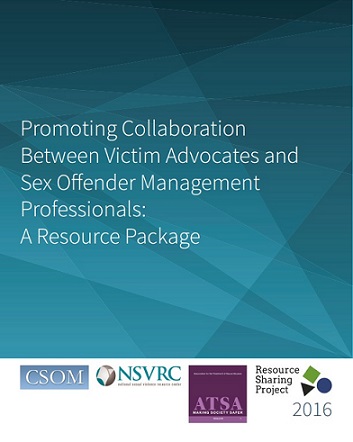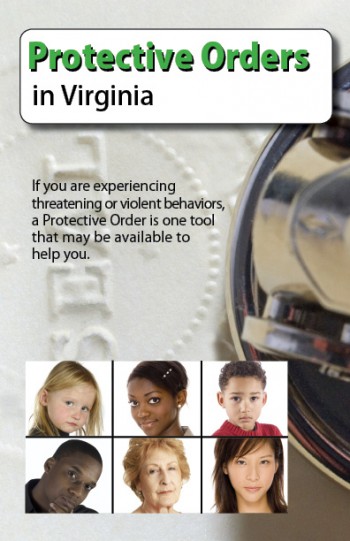Start a Search:
Author: Action Alliance
Promoting Collaboration Between Victim Advocates and Sex Offender Management Professionals: A Resource Package

This document was developed collaboratiely by the Center for Sex Offender Management, National Sexual Violence Resource Center, Resource Sharing Project, Association for the Treatment of Sexual Abusers, Office of Violence Against Women, Office of Sex Offender Sentencing, Monitoring, Apprehending, Registering, and Tracking (S.M.A.R.T.) This resource can be used for cross-training, self-learning, fostering dialogue among new or developing teams, public education, or otherwise supporting multidisciplinary collaboration to respond to sexual violence.
Protective Order Booklet (English)

A pamphlet that thoroughly and plainly describes Virginia's Protective Order process. Includes: What is a Protective Order (P.O.)? Who is eligible to ask for one? Where to request a P.O.? What are the 3 types of P.O.s? What can a P.O. do? How do I ask for an Emergency P.O.? Where do I go to petition for a Family Abuse P.O.? Where do I petition for a (General District Court) Protective Order? Now that I have a P.O., what do I need to know? Also includes information about Protective Orders for teen dating violence, and guidance for the Lesbian/Gay/Bi-Sexual/Transgender (LGBT) Community. 16 pages. Published July 2011.
Order brochures and other materials from the Action Alliance.
Protective Order Webinar Series
Protective Orders have been a lifesaving tool for survivors of intimate partner and sexual violence for many years in VA. However, a thorough understanding of whether or not a protective order is a useful tool for a particular survivor and the community structure for effective issuance and enforcement are what makes protective orders valuable tools in ensuring safety and accountability.
This 4 -part series on Protective Orders in Virginia reviewed and discussed the history of protective orders, what types are available and how survivors access them, what do advocates need to know to assist survivors in effective use of them, and finally, new firearms restrictions related to protective orders and how to build a community structure to ensure the most effective enforcement of them.
Session 1: History and Overview of Protective Orders
This webinar, facilitated by Ruth Micklem (VSDVAA) and Susheela Varky (VPLC), discusses the history of Protective Orders (PO’s) in Virginia; their purpose; and the role of advocates in PO cases.
Recording: https://youtu.be/2-l-U7AAriA
Presentation slides: http://bit.ly/POslides910
Handout 1 (History of Virginia POs): http://bit.ly/POhistory910
Handout 2 (Assessment tool): http://bit.ly/POassmt910
Session 2: Nuts and Bolts of PO’s
Caitlin Bradley (VSDVAA) covers the mechanics of PO’s - each type of PO; reviews the forms used for requesting and modifying PO’s; reviews the types of relief sought in PO’s; and discusses preparing survivors for court.
Recording: https://youtu.be/woIG4KjHmiQ
Presentation slides: https://bit.ly/POseries2slides
Session 3: Real-World Application of PO’s
Susheela Varky facilitates a panel-style discussion about the enforcement and real-world application of PO’s from the perspective of Legal Aid attorneys who are practicing on the ground. Participants were invited to submit questions beforehand and panelists shared real-world experience and perspective on PO cases, especially during COVID-19. Panelists included:
a. Sherron Ashby, Domestic Violence Attorney, Blue Ridge Legal Services (BRLS)
b. Nora Mahoney, Family Law Practice Group Chair, Legal Services of Northern Virginia (LSNV)
c. Jamesa Parker, Staff Attorney, Legal Aid Society of Eastern Virginia (LASEVA)
Recording: https://youtu.be/tZrogP_m_OE
Presentation slides: http://bit.ly/POseriesPPT3
Handout (VAWA Compliant Release Form): https://bit.ly/POSeriesVAWARelease
Session 4: Protective Orders and Firearms
Ruth Micklem discusses special considerations when firearms are involved. This webinar covered new legislation regarding firearms; safety considerations regarding firearms; and a discussion around community responses to firearms and PO’s.
Recording: https://youtu.be/ko8t7X1tnTQ
Presentation slides: http://bit.ly/POseriesPPT4
Protective Orders in Virginia - A Training
Virginia Sexual and Domestic Violence Action Alliance staff produced this power point presentation to train sexual and domestic violence advocates on the Virginia protective order process. This 31-slide presentation provides an overview of the different types of protective orders, describes how individuals can petition for them and how they work, and includes links to relevant VA Code sections.
Q&A for Advocates and Attorneys Serving Immigrant Survivors of Gender-based Violence
Who is this document for?
This is a Question and Answer (Q&A) for domestic violence and sexual assault (DV/SA) victim advocates and attorneys who are serving immigrant survivors of gender-based violence, both undocumented survivors and survivors who may be eligible for VAWA self-petitions, U visas, T visas or applying for gender-based asylum. Keep in mind that this information may change as we learn more about the plans of the incoming administration. This document is not legal advice or authority, but rather, it is for informational purposes only, not for media distribution.
Why is this important for survivor safety?
President-elect Trump pledged to make several sweeping changes to immigration policy within his first 100 days. Several of those changes are related to the potential termination of the Deferred Action for Childhood Arrivals (DACA) program and increased enforcement and stricter penalties for those with criminal records and those who re-enter after a previous removal order. As of right now, we do not know whether the incoming administration will be specifically looking to make changes to survivor-based immigration relief. Nonetheless, staying informed about the national and local law enforcement policies and practices is essential to safety planning with survivors of gender-based violence (domestic violence, sexual assault, trafficking). If you are a victim service provider who works with immigrants and want more information about local law enforcement immigration policies and practices, please contact the Domestic and Sexual Violence Coalitions in your state.
Read and download the English Q&A document here.
Read and download the Spanish Q&A document here.
Questions this document answers:
This document was prepared by Americans for Immigrant Justice, Asian Pacific Institute on Gender-Based Violence, ASISTA Immigration Assistance, Casa de Esperanza: National Latin@ Network; Center for Gender & Refugee Studies, Freedom Network USA, Immigrant Legal Resource Center, Immigration Center for Women and Children (ICWC), Julie Marzouk Assistant Clinical Professor, Dale E. Fowler School of Law at Chapman University, Minnesota Coalition for Battered Women, National Immigrant Justice Center, Tahirih Justice Center, We Belong Together.

